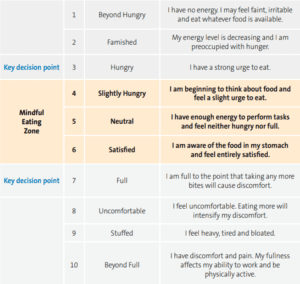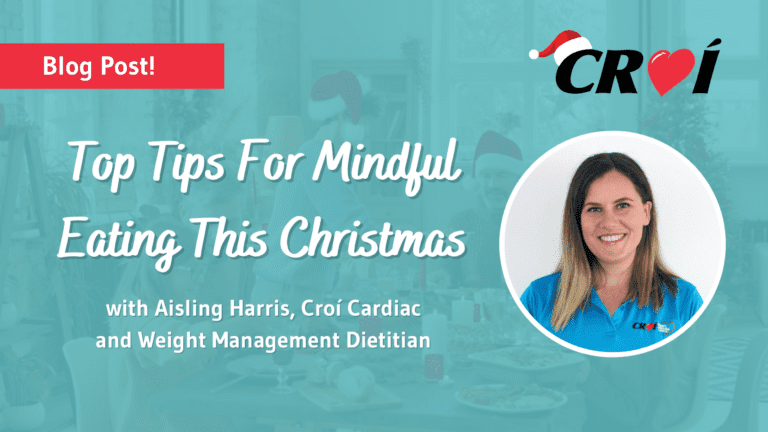While Christmas is an enjoyable time, there’s no doubt that food is a central component. This can make it a challenging time if you struggle around food or have a difficult relationship with foods. Learning to eat more mindfully and intuitively can help you feel more in control around food, feel less guilt about food choices and is a valuable skill to practice throughout the year, not just at Christmas. Learning to eat mindfully takes time, however, here are our top tips for getting started:
- Eat foods that make you feel good – physically and mentally. For some people, this could be a creamy hot chocolate while watching your favourite Christmas movie or a mince pie with a friend. These foods might nourish our mind and our mood. Other times you might crave a piece of fruit, an extra helping of veg with your dinner or an alcohol-free day because you feel like your body is craving this. There are no ‘good or bad’ foods, just food. Same as we are not ‘good or bad’ depending on the foods we eat. Removing feelings of shame or guilt around food gives us so much more freedom and ultimately, we are more likely to choose a balanced diet.
 Check in with your hunger and fullness signals. Sometimes we can become out of touch with our hunger and fullness signals and not trust ourselves to know when we are hungry or full. This can often be a result of years of dieting, following restrictive meal plans and being told exactly what and when to eat. No wonder we can be scared to trust ourselves. However, we can learn to connect with these signals again. You can do this by regularly using the hunger scale (right). Ideally you would like to be around a 4 before a meal and 6 after a meal. Look out for hunger signals like stomach grumbling, constant thoughts about food, low energy levels, feeling faint or irritable. It’s also important to check in with your fullness signals, particularly at Christmas when we tend to be surrounded by endless supplies of food. We can override the feeling of fullness and intentionally eat more, sometimes to the point of feeling uncomfortably full. Check in with yourself while you are eating and if you’re starting to feel satisfied, stop. You an always come back and finish the meal later if you are still hungry.
Check in with your hunger and fullness signals. Sometimes we can become out of touch with our hunger and fullness signals and not trust ourselves to know when we are hungry or full. This can often be a result of years of dieting, following restrictive meal plans and being told exactly what and when to eat. No wonder we can be scared to trust ourselves. However, we can learn to connect with these signals again. You can do this by regularly using the hunger scale (right). Ideally you would like to be around a 4 before a meal and 6 after a meal. Look out for hunger signals like stomach grumbling, constant thoughts about food, low energy levels, feeling faint or irritable. It’s also important to check in with your fullness signals, particularly at Christmas when we tend to be surrounded by endless supplies of food. We can override the feeling of fullness and intentionally eat more, sometimes to the point of feeling uncomfortably full. Check in with yourself while you are eating and if you’re starting to feel satisfied, stop. You an always come back and finish the meal later if you are still hungry.- Check in with your mood. If you are craving something to eat, but you don’t actually feel hungry, check to see if this is more of an emotional hunger rather than a physical hunger. Often, we crave certain foods in response to emotions such as stress, boredom, loneliness, tiredness etc. Ask yourself ‘What emotion am I feeding?’. Over time this helps us to separate physical and emotional hunger and can help us to learn other ways of coping with our emotions. Some things that can help would be to include some gentle movement of exercise, getting stuck into your favourite hobby or taking 10 minutes to practice some mindfulness.
- Ditch the weighing scales. Your value is not measured by a number on the scales. Your health cannot be measured by a number on the scales. If, like a lot of people I work with, you find the scales can affect your mood and your behaviours then get rid of it. Focus on measuring your progress in other ways – are you noticing an improvement in your mood, energy levels, sleep, fitness? Do you feel like you are developing a better routine and healthier habits? Have you noticed improvements in your blood pressure, cholesterol or diabetes control? These are the ways you should measure your progress, not by a number on a weighing scales.
- Don’t plan to start a diet in January. You may be familiar with the cycle – restrict in November, go all out in December, and then come January 1st clear out the cupboards and go cold turkey. Only to eventually fall back into old habits after a few weeks. This approach doesn’t work long term. Finding a way of eating and exercising that is sustainable, that doesn’t restrict foods and doesn’t make us feel guilty or ashamed when we inevitably go ‘off plan’ is a much healthier and more effective approach. Why not try set goals that are realistic and achievable? For example, aim to start eating 3 meals per day and not skipping lunch, try to get one less takeaway per week and aim to go for at least 3 half hour walks each week. These are much more realistic goals than ones like saying you will cut out all sweets, chocolate, takeaways, cook all meals from scratch and exercise every day for the next year. Don’t set yourself up to fail.
If you would like to find out more about mindful and intuitive eating, Croí will be running intuitive eating group programmes in 2024. Please click here for more information.

Written by Aisling Harris, Croí Cardiac
and Weight Management Dietitian
